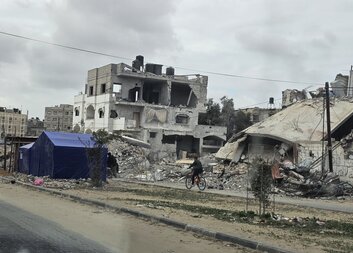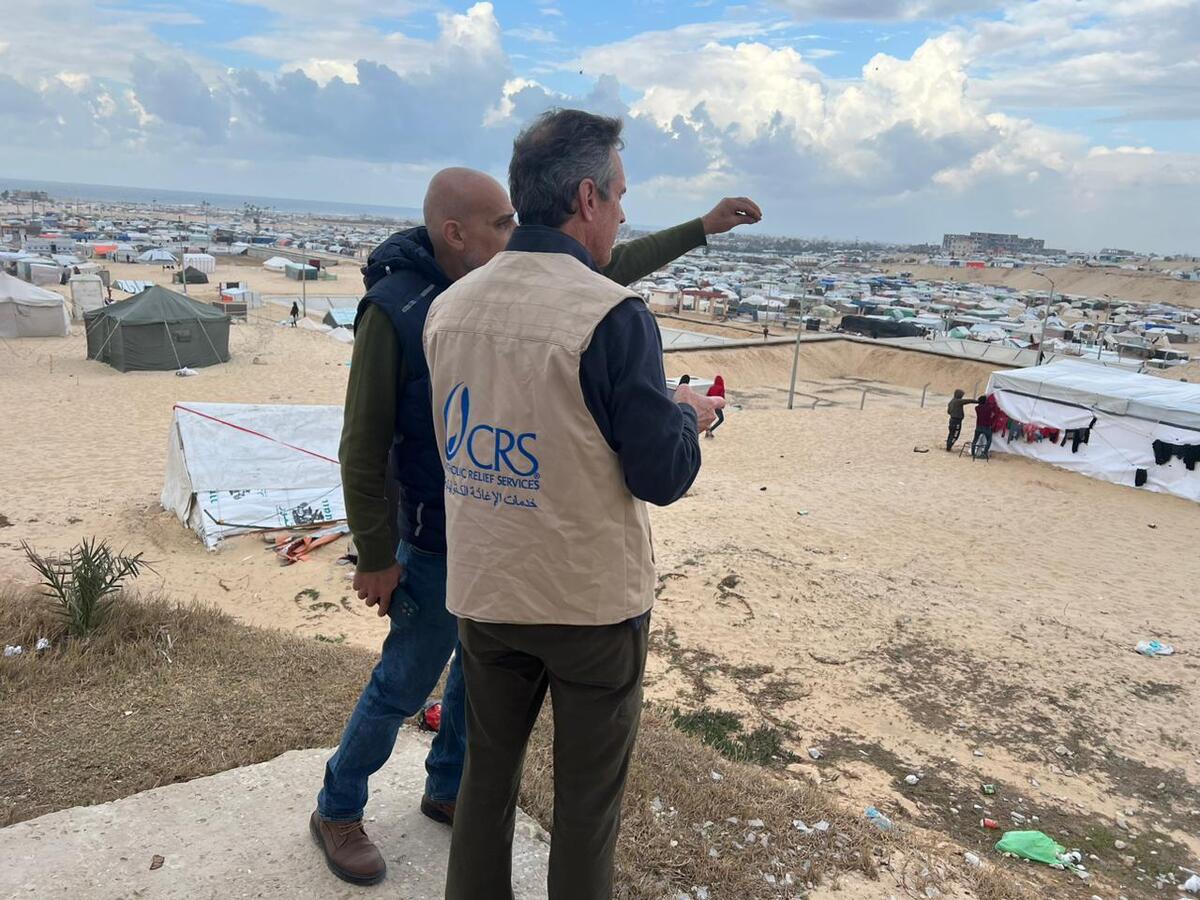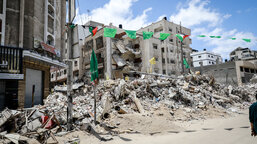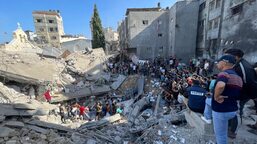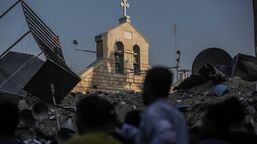The escalation of the conflict in Gaza has been going on for 220 days now, with tragic consequences for the population. People are living in desperate conditions without access to basic needs and health services. More than 35 000 Palestinians have lost their lives and almost 2 million people have been forced to leave their homes. Moreover, the expansion of Israeli military operations into Rafah in southern Gaza is leading to further massive displacement. Caritas continues to provide humanitarian aid in Gaza despite the dire conditions.
DONATE TO HELP CIVILIANS IN GAZA
Healthcare in Gaza is collapsing
More than 7 months have passed since the brutal attack on Israel by Hamas fighters escalated into the current war in the Gaza Strip. After months of relentless bombardment across Gaza, the area is utterly devastated. More than 35 000 Gazans have lost their lives and more than 78 000 others have been injured. Over 130 hostages are also still being held in Gaza.
The availability of basic health services in the Gaza Strip is particularly tragic. Few people have access to medicine or healthcare. Moreover, the Gaza Ministry of Health warns that unless hospitals receive more fuel, the health system in Gaza will collapse within hours. "The destruction of health facilities, unbalances, electricity blackouts, the killing of health providers and shortage of drugs and medical supplies are all leading to the collapse of the health system in Gaza," Jihad Al-Hessi, a medical consultant from Caritas Jerusalem, which continues to provide aid in Gaza despite the critical conditions, describes from Rafah.
Dr. Al-Hessi, along with a hundred staff members from our partner organisation Caritas Jerusalem, is providing essential aid to the people of Gaza despite the critical conditions. "The situation in Gaza and especially in Rafah is truly dire and heartbreaking. It is devastating to hear about the loss of lives. Caritas Jerusalem's decision to resume its activities in Gaza is therefore crucial. Humanitarian organisations provide aid and support to those in need," says Dr Al-Hessi.
Caritas continues to help in Gaza
Until recently, Caritas Jerusalem had 24 doctors in Rafah, half of whom fled the area due to forced evacuation. Part of the operations of Caritas Jerusalem has moved to the central areas of the Gaza Strip. The doctors provide care in absolutely desperate conditions, among the ruins of bombed-out buildings and in makeshift shelters in refugee camps that shelter people who have fled to Rafah from other parts of Gaza. Caritas provides health care to people in need, including pregnant women and newborns, for whom it provides vital postnatal care.
There is also a catastrophic shortage of food, drinking water and basic necessities. Dr Al-Hessi warns that without an immediate ceasefire, famine will break out in Gaza. Already, the majority of the area's population does not have access to sufficient food. According to the United Nations World Food Program, famine has already occurred in the most isolated parts of the northern Gaza Strip. Ordered evacuations from Rafah in southern Gaza and increased military activity have continued to worsen access to food. Thus, the number of children in Gaza suffering from acute malnutrition continues to rise, as do infections with infectious diseases.
"Overcrowding, destruction of buildings, universities, schools, health facilities, infrastructure, flooding of sewage in the streets, solid waste, scarcity of water cause the spread of infections such as hepatitis A, diarrhoea diseases, respiratory infections, meningitis, chicken pox, skin infections, and rise in deaths," Dr. Al-Hessi says, adding that people with chronic diseases and cancer are dying due to the lack of health care.
The closure of the Rafah crossing has also halted all evacuations of critically ill and injured patients outside Gaza. Humanitarian organisations have been forced to halt evacuations of patients from the north to the south of Gaza due to an acute shortage of fuel and due to insufficient bed capacity in medical facilities in the south of the Strip.
Massive displacement from Rafah
Israel continues to bomb and attack most of the Gaza Strip. The extension of operations towards the city of Rafah in the south of the area is leading to the forced displacement of residents who have fled to Rafah. More than a million Palestinians have taken refuge in Rafah from fighting in other parts of Gaza. More than 360 000 of them have already left Rafah again since the 6th of May for the areas of Khan Younis and Deir al Balah. Twenty per cent of Gaza's population has been displaced again in the last week alone.
This is the severalth time in the last seven months that these people have been forced to flee. Due to insufficient capacity in existing camps, unofficial refugee camps are being set up in southern Gaza, lacking functioning infrastructure as well as access to the basic necessities of life. People are building makeshift shelters on the rubble of destroyed buildings or seeking refuge in empty school buildings.
Due to the closure of the Rafah border crossing, supplies of essential aid, including food and fuel, are rapidly dwindling. Even before the closure, the supply of humanitarian aid was already inadequate compared to the enormous need. Its distribution is complicated by the poor security situation and the extensive military operations, as well as the intensive aerial bombardment of densely populated urban areas. In Gaza, the attacks have resulted in the deaths of 200 aid workers, including two of our colleagues, and hundreds of health workers.
There is currently no safe place in Gaza. Attacks are taking place all over the territory, not avoiding hospitals, schools or religious buildings. The intense attacks and forced evacuations are having a disastrous impact on the people of Gaza.
The situation in the West Bank
The escalation of the conflict has also had a dramatic impact on the West Bank, where there has been an increase in violence, arbitrary detentions and house demolitions. In addition, Israel has closed the borders and revoked work permits of people working in Israel. Restrictions on movement and escalating violence are depriving the people there of their livelihoods and preventing farmers from accessing their fields, with serious socio-economic consequences for the already impoverished population in the occupied Palestinian territory.
The situation is also desperate in the Jenin refugee camp in the West Bank, where Caritas Jerusalem is helping. Together with partner organisation Catholic Relief Services, it provides basic humanitarian and medical assistance, including psychosocial support. Twenty thousand residents live in the camp, which was established in 1953 for Palestinians who fled or were displaced from their homes after the 1948 Arab-Israeli war. They face shortages of drinking water and constant power cuts. There is neither adequate sanitation nor decent shelter in the camp.
Caritas is helping to repair destroyed shelters in the area. It is also providing cash assistance to people affected by the conflict so that they can buy basic necessities.
Caritas is also helping in Gaza thanks to Czech donors
Despite the catastrophic conditions, Caritas continues to help people affected by the war in Gaza. In addition to providing medical care in makeshift conditions, our colleagues from Caritas Jerusalem are also helping to provide basic humanitarian needs as well as important psychosocial support.
Caritas has also repeatedly called for a ceasefire and the release of all hostages and those wrongly detained.
Thank you to all those who join us in helping civilians in Gaza by contributing to the Caritas for Gaza appeal.
DONATE TO HELP CIVILIANS IN GAZA

